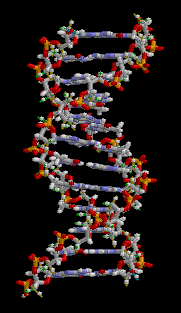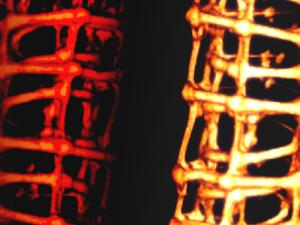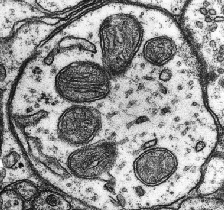 By now we all know that DNA is an informational molecule encoding the genetic instructions used in the development and functioning of all known living organisms and many viruses (Wikipedia). But very recently, Harvard University bio engineers at the Wyss Institute have shown that deoxyribonucleic acid can also be used as a tool. Specifically, two teams have published eye-opening studies on using DNA creatively to:
By now we all know that DNA is an informational molecule encoding the genetic instructions used in the development and functioning of all known living organisms and many viruses (Wikipedia). But very recently, Harvard University bio engineers at the Wyss Institute have shown that deoxyribonucleic acid can also be used as a tool. Specifically, two teams have published eye-opening studies on using DNA creatively to:
Tags: Wyse Institute, synthetic biology, 2012, Massachusetts, bio research, Boston, BioResearch Product Faire Event, MA, Harvard, Harvard Medical School
At the Wyss Institute for Biologically Inspired Engineering at Harvard University, in the Longwood medical neighborhood in Boston, researchers have reached a biotech milestone with tremendous potential for future drug testing and development. Instead of resorting to animals for testing, they may soon be using a simulated organ that lives on a chip. It has mechanical and biological (cellular) parts, and yes, it breathes, thanks to a vacuum system that pumps air through. The bio-inspired micro-device has gone through several tests recently to assess its accuracy in mimicking the human lung when bacteria or potentially toxic drugs are introduced. Results: Positive. The lung-on-a-chip replicates responses found in animal models and observations of human lung function. Indeed, because the device uses human lung and blood vessel cells, it acts may act more like a lung in a human body than lab animals.
Tags: Northeast, Lab-on-a-chip Technology, 2012, Massachusetts, Cancer, biological, Boston, BioResearch Product Faire Event, MA, Harvard, innovative solutions, Drug Development, Harvard Medical School, bio medical research
We've heard about the Golden Fleece Awards (vilifying seemingly-obscure science research) and the Golden Goose Awards (lauding seemingly-obscure science research) more than a little often in this year of threatened federal science budget cuts, but that's more politics than anything else. It certainly isn't half as much fun as the infamous and much-laughed-with Ig Nobel Prizes, given out yearly in honor of improbable research so absurd-sounding we can't help but love it. At this year's awards ceremony, held last Thursday night at Harvard University, 10 unlikely science research projects received their due respect (and a few guffaws) at the hands of genuinely bemused genuine Nobel laureates.
Tags: CA, 2013, Northeast, Southwest, 2012, BioResearch Product Faire Front Line Event, Boston, BioResearch Product Faire Event, Event, MA, Harvard, science researchers, Harvard Medical School, UCSB, Santa Barbara, Happy scientist, UC Santa Barbara
 It's getting to the point where there's less and less relevant distinction to be made between life science and physical science research. It was clearer when one lab had petri dishes and the other had circuitboards, but what happens when you have both? That's the case in the Harvard University labs of chemist Charles Lieber and his medical school colleague Daniel Kohane, where the bio research team has successfully created living tissue embedded with tiny nanowires capable of running an electrical current so subtle that it does not harm the tissue cells. These 3D bioelectronic structures could potentially both relay complex information about what's going on inside the tissue and receive signals from an outside source such as instructions for repairs. Several news outlets are calling it cyborg tissue and envision its future use in implants, prosthetics, or even some kind of therapeutic microbot. More immediately it will most likely be used for drug testing in labs, as a precursor to animal or human trials.
It's getting to the point where there's less and less relevant distinction to be made between life science and physical science research. It was clearer when one lab had petri dishes and the other had circuitboards, but what happens when you have both? That's the case in the Harvard University labs of chemist Charles Lieber and his medical school colleague Daniel Kohane, where the bio research team has successfully created living tissue embedded with tiny nanowires capable of running an electrical current so subtle that it does not harm the tissue cells. These 3D bioelectronic structures could potentially both relay complex information about what's going on inside the tissue and receive signals from an outside source such as instructions for repairs. Several news outlets are calling it cyborg tissue and envision its future use in implants, prosthetics, or even some kind of therapeutic microbot. More immediately it will most likely be used for drug testing in labs, as a precursor to animal or human trials.
Tags: Northeast, MIT, cell biology, 2012, Biochemistry, Massachusetts, biorobotics, Cell Research, chemistry research, bioprinting, Boston, BioResearch Product Faire Event, MA, Harvard, Harvard Medical School
There's been a lot of promising news lately on the HIV/AIDS drug and treatment front, and more scientific solutions are being developed in labs every day. Bringing new vaccine and drug treatments to fruition has been challenging, though, as test animals such as mice do not have immune systems that are similar enough to ours to predict what would really happen in a human model. Now, at bio science research labs at the Ragon Institute in Boston, scientists have overcome that obstacle by engineering a mouse with what is essentially a human immune system. The Ragon study just published in Science Translational Medicine successfully demonstrated that these "humanized mice" do in fact respond like a human does when infected with HIV. This is a big step towards developing and testing new vaccines in the lab.
Tags: Harvard University, Northeast, AIDS Research, animal research, 2012, Immune System, Boston, BioResearch Product Faire Event, MA, Harvard, BRPF, scientist solutions
November is Diabetes Awarness Month and November 14th is World Diabetes Day. With that we would like to feature Harvard Medical School's Dr. Denise Faustman, who has been awarded the 2011 George and Judith Goldman Angel Award for her biomedical research on a cure for Type 1 diabetes.
Tags: biomedical research, Northeast, 2012, Boston, BioResearch Product Faire Event, MA, Harvard, Harvard Medical School, National, 2011

In perhaps the crowning achievement of a decade of work, a group of Harvard University researchers have identified the specific protein responsible for calcium absorption in mitochondria, solving a long-standing and crucial problem for our understanding of an essential cellular component.
Drawing on resources such as "the Human Genome Project, freely downloadable genomic databases, and a few tricks," as Vamsi Mootha, the project leader and associate professor of systems biology at Harvard Medical School, put it, the project represents a significant step forward for the field and should open the door to treatment of a number of diseases thought to be related to calcium deficiency in mitochondria. Particularly remarkable about the study is its synthesis of recently-developed cellular and genomic technologies to solve the problem.
Tags: Northeast, cell biology, genome research, 2012, Boston, BioResearch Product Faire Event, 1 day only, Genomics, MA, Harvard, Harvard Medical School, 2011
Recently, Harvard scientists took on the challenge of expanding the catheter's capabilities to address specific requirements of open heart surgery while simultaneously offering a significantly less invasive approach to complex cardiac procedures.
Tags: Harvard University, Northeast, 2012, Massachusetts, biorobotics, Boston, BioResearch Product Faire Event, MA, Harvard, 2011
This story not only amazed us but brought home how important the work of researchers and medical equipment technology developers is in real time, right now, for saving the lives of actual people. Read the update below, too. -- 12/23/2011
Tags: Harvard University, Northeast, Stem cell research, Translational Research, 2012, Massachusetts, Boston, BioResearch Product Faire Event, Event, MA, Harvard, Laboratory Equipment Supplier, Research equipment, transplant success story, 2011

